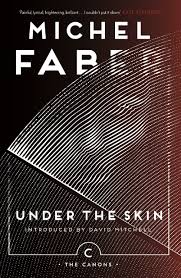Under the Skin by Michel Faber
 Little Miss Carnivore
Little Miss Carnivore
Under the Skin by Michel Faber is the story of Isserley, an alien life form who has been surgically altered to appear human. Her job is to abduct fit young hitch hikers so they can be processed into a delicacy meat which is shipped back to her home planet.
NB: This is a review based on a re-read of one of my favourite books, and may be massively biased!
Content Warning: Sexual abuse, graphic descriptions of meat processing
Story ★★★★★
When I first read Under the Skin, the premise seemed utterly original to me. This may seem a bit naive -- planet invasion by copying human form is nothing new. But the way the story is set up is what makes it feel so different. The reader follows Isserley as the narrator uses sexually predatory language to describe her hunt for a fit young man. Not long after, the reader is introduced to some 'vodsels' near the end of their processing. The alterations and disfigurements that have been made to these men to promote their meat quality and production should come as no surprise to a fairly aware meat eater, but it still comes as a shock, as does Isserley's defence of what she does.
But this book is so much more than a vegan manifesto. The reader is invited to sympathise with Isserley, a woman who suffers constant pain and loneliness due to her surgical alteration, leaving her neither one nor the other. Her body has been designed based on pornographic magazines, her body designed to sexually attract in a way that is incredibly relevant to the various sexual harassment campaigns that are so active at the moment.
Under the Skin is also the story of Isserley's journey, her change in belief. Her home planet is a polluted wasteland, and the Scottish landscape seems to be the only thing left to her that she can love. It's the path of Isserley's ability to question the human or animality of the creatures she brings to the slaughter.
Style ★★★★★
Faber's style drifts between beautiful lyricism and blunt, sometimes gory description. Whatever the subject at hand -- be it snowy loch or butchering humans -- Faber is not afraid to shy away and will make the descriptions as pertinent as possible.
I personally find his style quite easy to read, and managed this re-read over a weekend.
The story is told in third person, but almost exclusively from Isserley's point of view. As a protagonist, she's a wonderfully complex character and it's surprisingly easy to sympathise with her, given what she does.
When Isserley picks up a hitch hiker, they are given a brief space of narration, giving the reader a flavour of their minds. Thereby, the reader is not allowed to fall into Isserley's trap and forget that these strays are human.
Substance ★★★★★
I first read Under the Skin while attending a conference on Faber's work in Inverness, at which the author was present. I had previously only read The Crimson Petal and The White, and so Under the Skin was a bit of a shock to the system. The conference was called Defying Genre, which is a perfect summation of Faber's work. It is difficult to categorise. There are aliens, but sci-fi doesn't seem quite right. There are horrific moments, but horror doesn't fit either. It would be easiest to pop Faber under the umbrella of 'literary fiction', but that always feels like cheating.
As I might have mentioned previously, Under the Skin is a crucial work in my Masters dissertation, where I will be arguing that Faber uses his work to propose faith as a definition for humanity. Many other academics have used Faber to explore the boundary between human and animal in (science) fiction.
Those interested in farming and/or food processing may find this an interesting and enlightening read. So would any who are just interested to know some home truths about where their food comes from and how it likely spends its last weeks.
Verdict ★★★★★
Under the Skin is a book with many layers, and passages to delight many interests. I won't claim it's a fluffy read -- it isn't -- but it does deliver a good story beautifully and graphically. Isserley is a vital and tragic protagonist; one that the reader can't help but ache for, despite the things she has done. If being the linch pin of my MA dissertation wasn't high enough praise, this being one of only a handful of books I've ever re-read should also speak volumes.

Comments
Post a Comment